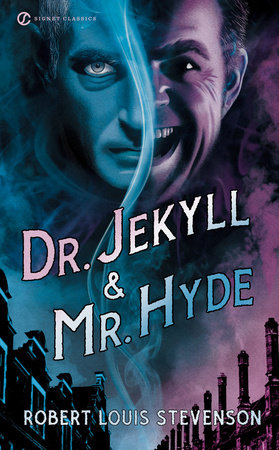Robert Louis Stevenson explores the very nature of man in this classic horror novel.
“Why did you wake me? I was dreaming a fine bogey tale.”Robert Louis Stevenson’s masterpiece of the duality in man’s nature sprang from the darkest recesses of his own unconscious—during a nightmare from which his wife awakened him, alerted by his screams.
More than a hundred years later, this tale of the mild-mannered Dr. Jekyll and the drug that unleashes his evil, inner persona—the loathsome, twisted Mr. Hyde—has lost none of its ability to shock. Its realistic narrative chillingly relates Jekyll’s desperation as Hyde gains control of his soul—and gives voice to our own fears of the violence and evil within us.
Written before Freud’s naming of the ego and the id, Stevenson’s enduring classic demonstrates a remarkable understanding of the personality’s inner conflicts—and remains the irresistibly terrifying stuff of our worst nightmares.
Includes the Famous Cornell Lecture on Dr. Jekyll and Mr. Hyde by Vladimir Nabokov
With an Introduction by Kelly Hurley
and an Afterword by Dan Chaon
Robert Louis Stevenson (1850-94) was born in Edinburgh. In the brief span of forty-four years, dogged by poor health, he made an enormous contribution to English literature with his novels, poetry, and essays. The son of upper-middle-class parents, he was the victim of lung trouble from birth and spent a sheltered childhood surrounded by constant care. In 1880, he married Mrs. Fanny Osbourne, a woman ten years his senios. The balance of his life was taken up with his unremitting devotion to work and a search for a cure to his illness that took him all over the world. His travel essays were published widely, and his short fiction was gathered in many volumes. His first full-length work of fiction,
Treasure Island, was published in 1883 and brought him great fame, which only increased with the publication of
The Strange Case of Dr. Jekyll and Mr. Hyde (1886). He followed with the Scottish romances
Kidnapped (1886) and
The Master of Ballantrae (1889). In 1888, he set out with his family for the South Seas, traveling to the leper colony of Molokai, and finally settling in Samoa, where he died.
Kelly Hurley is an Associate Professor of English at the University of Colorado at Boulder, where she teaches Victorian studies, literary theory, and popular culture. She is the author of
The Gothic Body: Sexuality, Materialism, and Degeneration at the Fin de Siècle, as well as various articles on Victorian and contemporary Gothic. Her next book is on horror film spectatorship.
Vladimir Nabokov (1899-1977) was born in St. Petersburg, Russia, in a trilingual household; he could read and write in English before Russian or French. His family went into exile after the Bolshevik revolution and lived in various European cities, including Berlin and Prague. In 1940, Nabokov and his wife and son fled the Nazis to America, where he taught college and wrote
Lolita (1955). After that book’s tremendous success, he was able to write full-time and moved back to Europe, eventually settling in Montreaux, Switzerland. Among his other notable books are
Pale Fire (1962) and
Ada (1969). In addition to his writing, he was a noted entomologist specializing in butterflies.
Dan Chaon is the author of the novels Await Your Reply and You Remind Me of Me, and two short story collections, Fitting Ends and the 2001 National Book Award Finalist Among the Missing. His work has appeared in numerous magazines, including Story, Ploughshares, and TriQuarterly, as well as Best American Short Stories and The Pushcart Prize 2000. The recipient of numerous prizes and honors, he is the Pauline Delaney Professor of Creative Writing and Literature at Oberlin College.

















